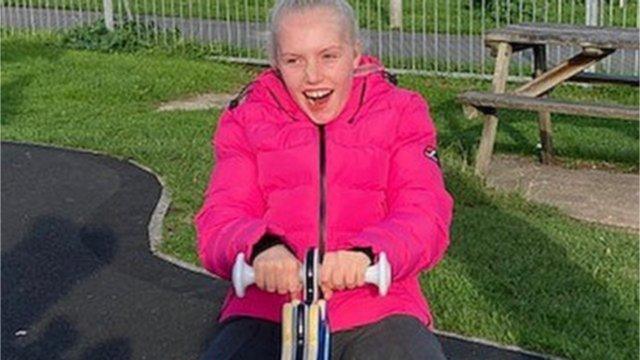Rare skin condition leads to stares and comments from strangers
- Published
Rhiannon Morgan has a rare genetic condition called epidermolytic ichthyosis
Rhiannon Morgan is used to receiving stares from strangers.
The 26-year-old is one of the few people in the UK living with a rare genetic skin condition called Epidermolytic Ichthyosis, external.
It means her skin grows too fast which makes it prone to blistering and causes her significant mobility issues.
But she hopes that raising awareness of visible disabilities like hers will encourage better representations across popular culture.
Rhiannon's whole life has evolved around people commenting on her rare condition. At the supermarket, people have asked whether the condition is contagious.
"Although I smile and make light of it, living with a visible difference is exhausting and can be incredibly lonely," she said.
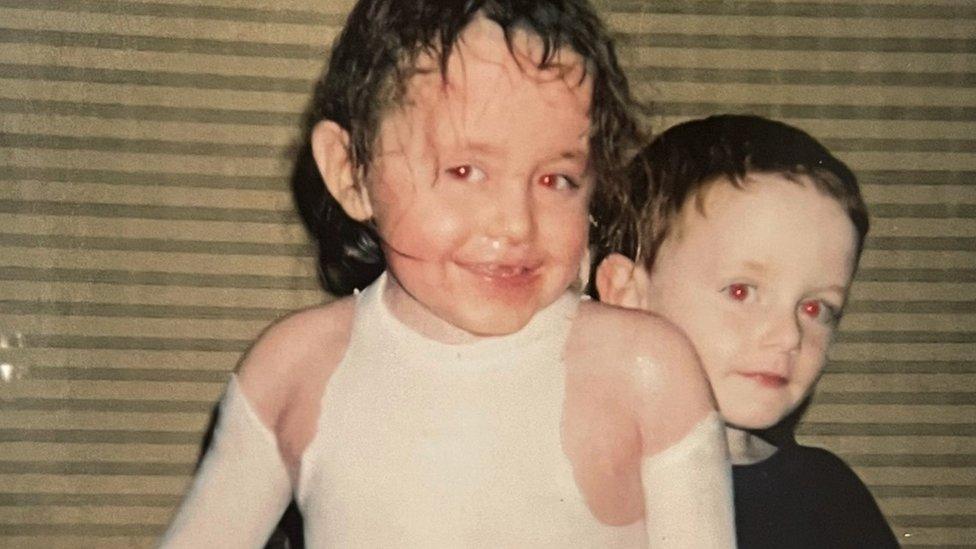
"When I was born, it looked like I had gloves on my hands and socks on my feet," said Rhiannon
"Strangers and peers believed it was ok to ask if I had been burned in a house fire or if I neglected myself."
Her rare genetic skin condition means that her skin grows too fast due to a gene abnormality which makes the skin prone to infection, blistering and fragility.
It causes significant mobility issues such as joint movement and hand dexterity, and often means she is forced to use her "trusty wheelchair" to get around.
"Roughly, five hours of my day is taken up by taking care of my skin," said Rhiannon, who lives in Bridgend.
'I was a medical anomaly'

Rhiannon has learnt to deal with strangers asking questions
She was diagnosed with her rare skin condition at birth, where midwives "floundered" when she was taken away to be cleaned as her skin came away with just the wipe of a washcloth.
"When I was born, it looked like I had gloves on my hands and socks on my feet, that was a tell-tale sign of where I would be affected the most," she said.
"I was incredibly lucky to be diagnosed at birth, as I could receive the medical support I needed from the start."
But since then she said she has experienced the social obstacles of living with a visible difference.
"Some classmates even refused to sit near me," she said.
This greatly affected how she saw herself in her formative years and avoiding mirrors became habitual for her as a teenager.
"I was a medical anomaly, so when I looked at my reflection, I saw someone who wasn't 'normal'," she added.
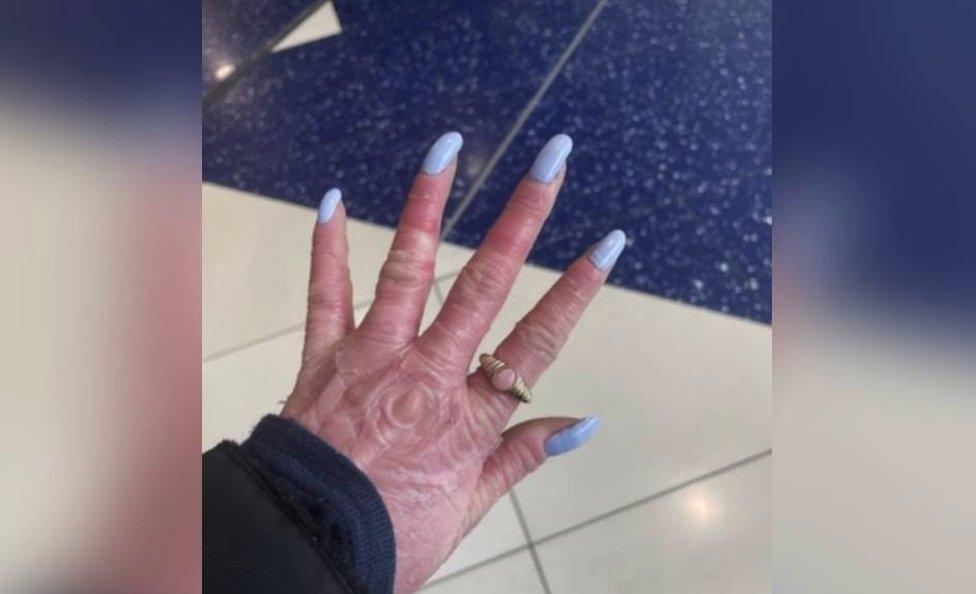
The rare skin condition and the comments she received "took a toll" on Rhiannon's mental health
Most of her hospital appointments were crammed full of students and consultants. She endured years of being looked at under a microscope and getting stared at by strangers.
She said it "took its toll" on her mental health and her perceptions of her own appearance.
When she was 13 she went to a medical conference where she said she was forced to sit on a bed in her underwear and vest. There, she had to speak to "about 100 doctors" on a rotational basis who wanted to learn all about her skin.
"Some were friendly, others lacked bedside manners, one even came and inspected me with a wooden tongue depressor," Rhiannon explained.
But she said her condition hasn't just been a bad thing.
"Nonetheless, having my condition has given me so many skills. I'm able to empathise with others, see beauty where others cannot, and experience the world in a unique way," Rhiannon added.
"I wouldn't change myself for anything."

Rhiannon (left) often uses a mobility scooter to help her get around
Rhiannon is sharing her story as part of the This is Me campaign by charity Changing Faces, external to coincide with Face Equality Week, external.
She hopes that it will raise awareness of visible disabilities and it will encourage more positive representations across popular culture.
A public poll by Focaldata found 33% of the public recalled seeing someone with a visible difference on TV.
Changing Faces is a UK-based charity for anyone with a scar, mark or condition that affects their appearance, and its skin camouflage service helped Rhiannon when she was 17 to try some makeup for her sixth form prom.
"I learned how to colour correct my skin to curtail redness and what specific makeup products would help hydrate my skin," she said.
"It also gave me someone to chat with who would listen to the concerns I had about my skin without judgement."
Changing Faces said in a statement: "Whilst we wait for brands, businesses, and broadcasters to catch up, our Changing Faces volunteer campaigners and ambassadors, including Rhiannon, are putting themselves out there on social media, saying 'This Is Me' and being the role models they, and many of the public, want to see more of."

THE IDEA: Inspirational talks from renowned entrepreneurs and academics
ABERYSTWYTH BOOK CLUB: Book club members review their latest read

Related topics
- Published9 May 2023
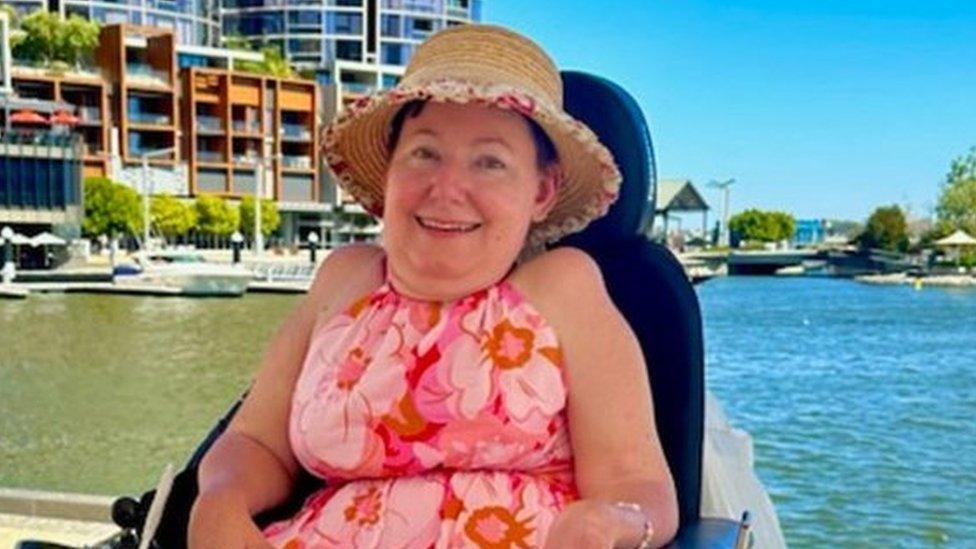
- Published17 February 2023

- Published20 January 2023
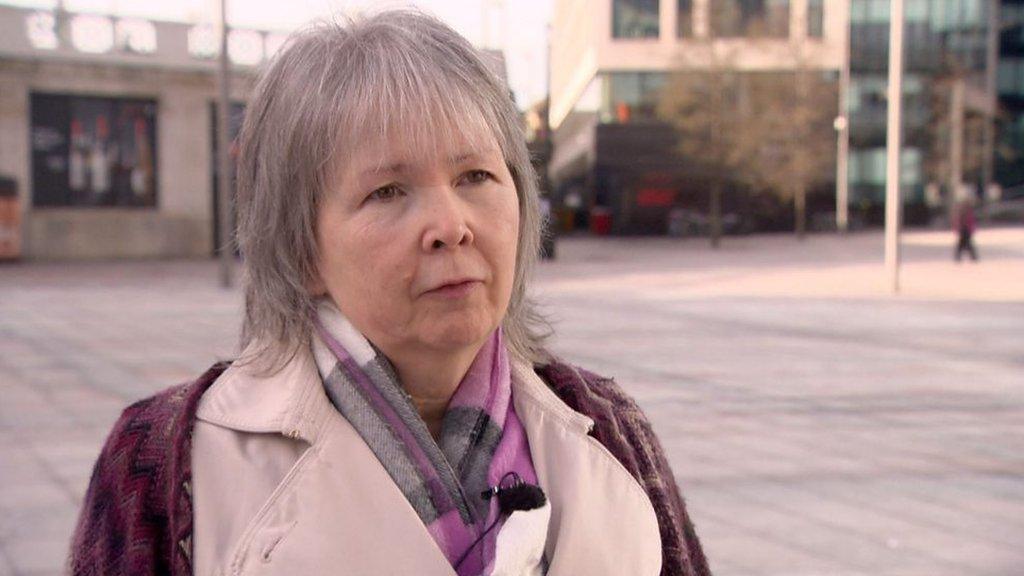
- Published3 November 2022
